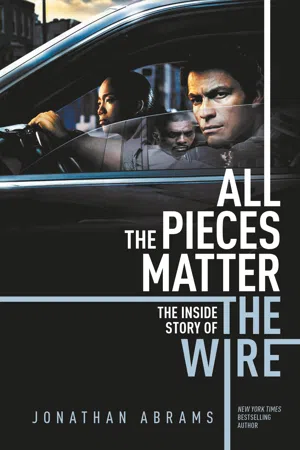
All the Pieces Matter
The Inside Story of The Wire
Jonathan Abrams
- 352 pages
- English
- ePUB (mobile friendly)
- Available on iOS & Android
All the Pieces Matter
The Inside Story of The Wire
Jonathan Abrams
About This Book
The definitive oral history of the iconic and beloved TV show The Wire, as told by the actors, writers, directors, and others involved in its creation
Since its final episode aired in 2008, the acclaimed crime drama The Wire has only become more popular and influential. The issues it tackled, from the failures of the drug war and criminal justice system to systemic bias in law enforcement and other social institutions, have become more urgent and central to the national conversation. The show's actors, such as Idris Elba and Dominic West, have gone on to become major stars. Its creators and writers, including David Simon and Richard Price, have developed dedicated cult followings of their own. Universities use the show to teach everything from film theory, to criminal justice and sociology. Politicians and activists reference it when discussing policy. When critics compile lists of the Greatest TV Shows of All Time, The Wire routinely takes the top spot. It is arguably one of the great works of art America has produced in the 21st century.
But while there has been a great deal of critical analysis of the show and its themes, until now there has never been a definitive, behind-the-scenes take on how it came to be made. With unparalleled access to all the key actors and writers involved in its creation, Jonathan Abrams tells the astonishing, compelling, and complete account of The Wire, from its inception and creation through its end and powerful legacy.
'From the moment The Wire ended, all I have wished for is one more season. Jonathan Abrams has given us something just as valuable — the complete story of how something this wonderful, rich, and intricate came to be' - Mike Schur, creator of Parks and Recreation, Brooklyn 99 and The Good Place
'The definitive dissection of television's most politically meaningful invention' - Chuck Klosterman, New York Times bestselling author of But What if We're Wrong? and I Wear The Black Hat
'Abrams indisputably has created a thorough examination of The Wire 's conception, production, and lingering cultural afterlife' - Publishers Weekly
Frequently asked questions
Information

Table of contents
- ALL THE PIECES MATTER
- About the author
- 1
- 2
- 3
- 4
- 5
- 6
- 7
- 8
- 9
- 10
- Picture Section
- Copyright